
It’s devastating when the worst happens to our loyal companions.
It’s a topic nobody wants to think about, but online searches for « signs of lymphoma in dogs » have risen by 86% as searches for « lymphoma signs in cats » are up 33% compared to the same time last year.
Cancer is, unfortunately, a common condition in both dogs and cats, and pet owners should know the signs.
In light of this, Dr Anna Foreman, the in-house vet for Everypaw Pet Insurance, has explained the common signs to recognise, the breeds more likely to develop cancer, and whether any ingredients could cause cancer.
According to the vet, the dogs most at risk of ‘cancerous changes’ are Golden Retrievers and Boxers, and for cats, Siamese and Persian.
What are the signs of cancer in dogs and cats that could be easy to miss?
Signs of cancer in dogs and cats are variable and non-specific.
Weight loss is a very common finding – neoplastic processes require a lot of energy to grow, taking this energy away from what an animal is eating each day. An animal will therefore lose weight despite an often good appetite.
Drinking more and weeing more is a common sign too.
Gastrointestinal cancers may lead to vomiting and diarrhoea, lung cancers to breathing difficulties, and mouth cancers to halitosis (bad breath) and difficulty eating.
Cancer can cause pain, which commonly manifests in behavioural changes such as hiding away, aggression, not wanting to go for a walk etc.
Animals, particularly cats and small furries, are good at hiding signs of cancers – often changes are picked up at routine examination at vaccination. Clinical signs of cancer are often commonly mis-interpreted as age related changes like ‘slowing down’, losing muscle, eating less etc.
Are there any breeds of cat or dog more prone to cancer?
Some breeds of dogs and cats are more prone to cancerous changes. Flat-coated retrievers very commonly succumb to cancer – more than 50% of flat-coat retrievers die of cancer, with a malignant systemic condition called histiocytic sarcoma being particularly prevalent.
Large, pedigree breed dogs are more prone to cancerous changes – Golden Retrievers, Bernese Mountain dogs, Italian Spinone and Boxers amongst these. Small mixed breeds are less likely to develop cancer.
Cats are less likely to develop cancer than dogs, however amongst the cat population, Siamese and Persian cats are particularly prone to cancerous change.
« Large, pedigree breed dogs are more prone to cancerous changes – Golden Retrievers, Bernese Mountain dogs, Italian Spinone and Boxers amongst these, » she said.
Small mixed breeds are less likely to develop cancer. Cats are less likely to develop cancer than dogs, however amongst the cat population, Siamese and Persian cats are particularly prone to cancerous change. »
What types of cancer are more common in certain dog breeds than others?
Cancer is known by the term neoplasia – neoplastic change is abnormal cell growth that leads to the development of a tumour or ‘cancer’.
Skin cancer
Tumours can range from benign skin lumps to more malignant systemic diseases that affect the whole body.
Skin ‘cancer’ is common in dogs and cats, and can range from benign masses which are slow growing and can be removed to cure the condition, to more malignant, invasive masses which require surgery, chemotherapy, or radiotherapy to treat – and a cure is not always possible.
For example, Staffordshire bull terriers and French bulldogs are prone to a type of cancer called mast cell tumours. Within this classification, mast cell tumours can behave in more of a benign or malignant fashion.
White cats are prone to squamous cell carcinomas of the ear tips and nose due to poor melanin protection from UVA/UVB. More benign skin cancers can include warts, skin tags and basal cell tumours.
Lymphoma
Lymphoma is unfortunately a common cancer of both dogs and cats. It is a more malignant type of cancer that spreads in the body.
It can either be a systemic disease, like multicentric lymphoma in dogs, or of a specific organ, such as renal lymphoma in cats.
Chemotherapy is often used alongside surgery to treat this condition, however is not always curative.
Bone cancer
Osteosarcomas are a common malignant bone cancer of larger breed dogs, for example greyhounds, German Shepherds and Rottweilers.
Sadly, they are very painful bone tumours and often spread to the lungs. Extreme lameness that does not improve with pain relief is a common clinical sign of the cancer.
Do any ingredients or foods cause cancer in dogs and cats – if so, what are they?
Most pet foods, particularly good quality ones, are non-carcinogenic.
However, the ingredient carrageenan, a thickening agent in some pet foods, has come under scrutiny for causing inflammation in some animals.
Although inflammation is not cancer, cellular change can occur in response to inflammation which can ultimately lead to neoplasia (cancer). Certain preservatives like BHT and BHA have been anecdotally linked to cancerous change.
The main ingredient or lack of in dog/cat diets with a proven link to disease is grain free diets leading to heart disease, specifically DCM.
